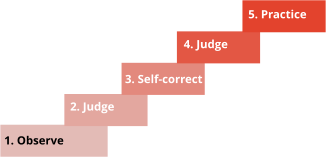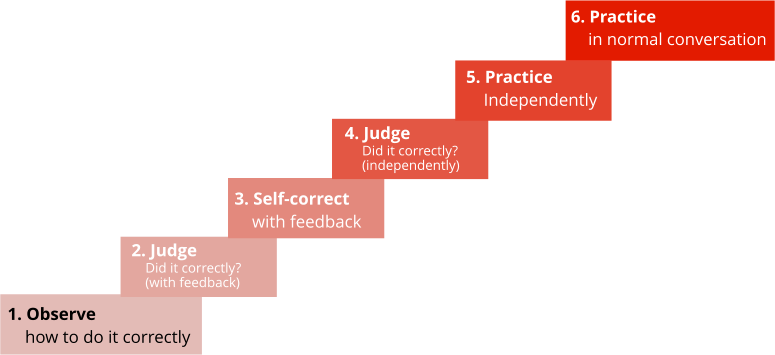How to reach your Speech Therapy Goals
Breaking goals down into specific, achievable steps.
 The
trick to crossing a river is to use stepping stones. The same is
true for any big challenge: figuring out how to break it into manageable
steps.
The
trick to crossing a river is to use stepping stones. The same is
true for any big challenge: figuring out how to break it into manageable
steps.
I’ve had my fair share of Physical Therapy. Most of
it’s pretty minor stuff, luckily. (Bear with me. This really is about
speech therapy goals. )
As my PT was teaching my how to do the exercises I realized that
we naturally recognize that PT has steps. You don't just go to the
PT and in 1 hour you're completely "cured".
 Therapy has several steps:
Therapy has several steps:
-
Observe how to do the exercise.
-
Learn to judge when you do it correctly (or not), with assistance from the PT.
-
Practice the exercise, self-correcting when you judge you've done it wrong.
-
Learn to judge when you did it correctly (on your own).
-
Practice independently as you recover.
Break Speech Therapy Goals into Manageable Steps
I'm a parent coach of my daughter's robotics team. One of the things
our fantastic head coach teaches the kids is that you have to break the
goal into small steps. His example is you can't plan like this:
Plan for trip to the Moon:
- Build Rocket
- Fly to Moon
- Land
- Fly Home
You need to break the goal down into simpler steps than above.
 My analogy is that you can't eat a steak in one bite. You
literally cut it into pieces. So, we have to break speech
therapy goals down into pieces as well. And the first steps are critical. If you
get them wrong, the rest of therapy is frustrating and, worse, less
effective.
My analogy is that you can't eat a steak in one bite. You
literally cut it into pieces. So, we have to break speech
therapy goals down into pieces as well. And the first steps are critical. If you
get them wrong, the rest of therapy is frustrating and, worse, less
effective.
 Speech & language treatment can have a similar progression to PT,
but I think most people only think about the last step (am I 100% yet?).
That’s like spending the entire drive to Disney World asking Are we There
yet?
Speech & language treatment can have a similar progression to PT,
but I think most people only think about the last step (am I 100% yet?).
That’s like spending the entire drive to Disney World asking Are we There
yet?

work on your goals
Every day is an opportunity for recovery. Don't miss a single day.
- Surprising neuroscience discovery that makes recovery possible at any age.
- Why embracing failure leads to faster recovery.
- Unlock your survivor's communication needs in 4 steps.
- How to improve speech & language at the kitchen table.
Clay Nichols
Co-founder of
MoreSpeech and
Bungalow Software
for unlimited speech therapy at home and in the clinic.
 For
3 decades, Clay has helped patients, caregivers and speech pathologists
with speech & language software. He is not a speech-language
pathologist.
For
3 decades, Clay has helped patients, caregivers and speech pathologists
with speech & language software. He is not a speech-language
pathologist.
© 2025 Bungalow Software
 Observe the proper way to say the word
or compensatory strategies, like
Observe the proper way to say the word
or compensatory strategies, like